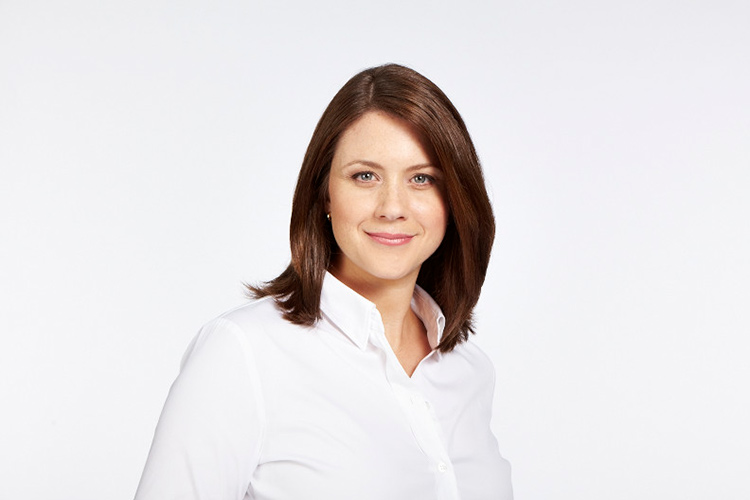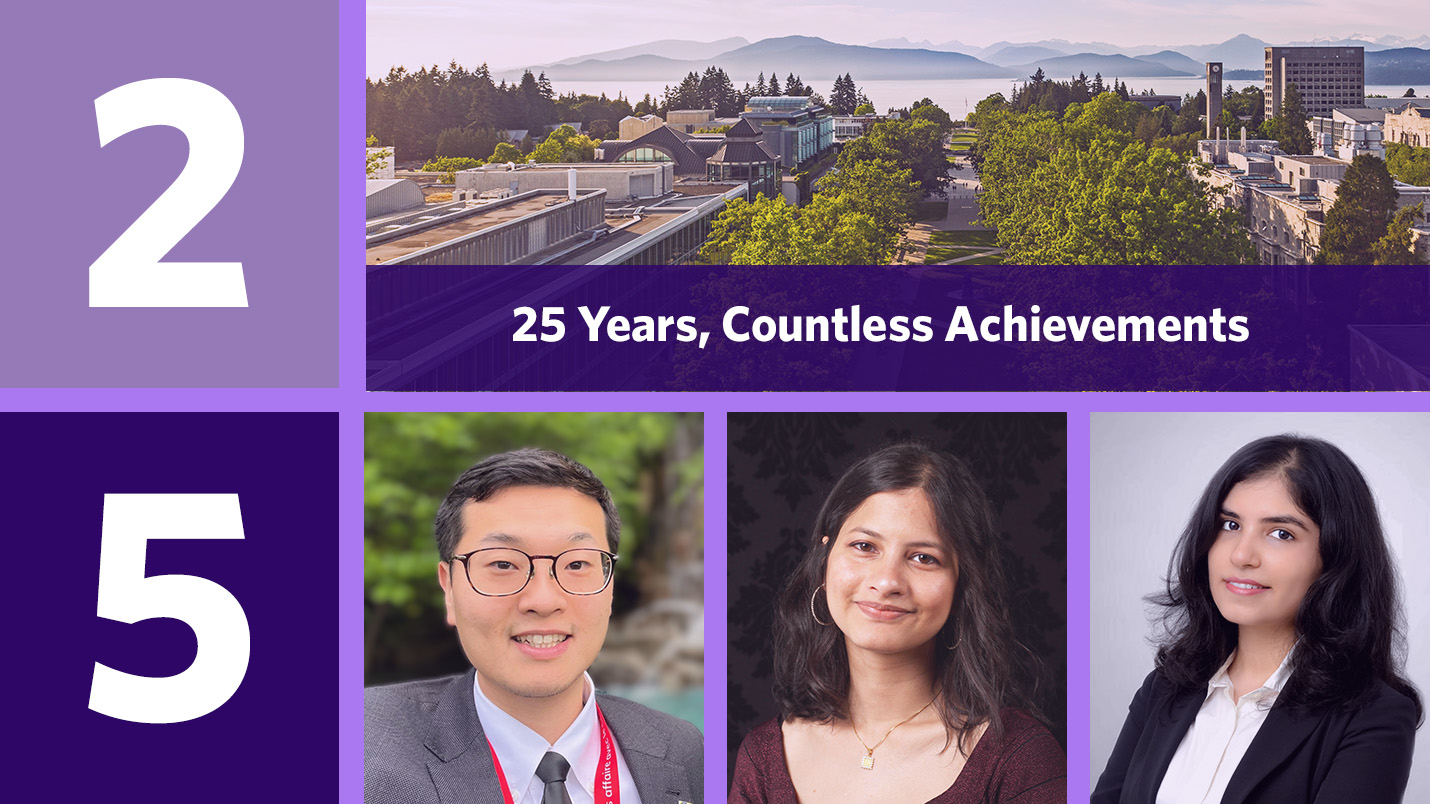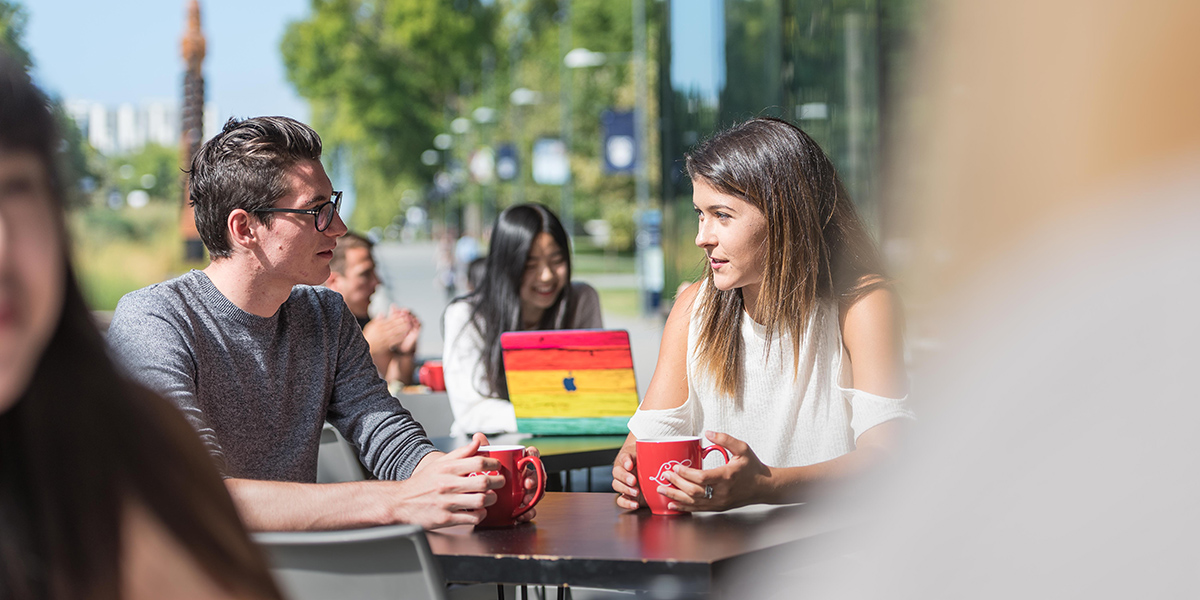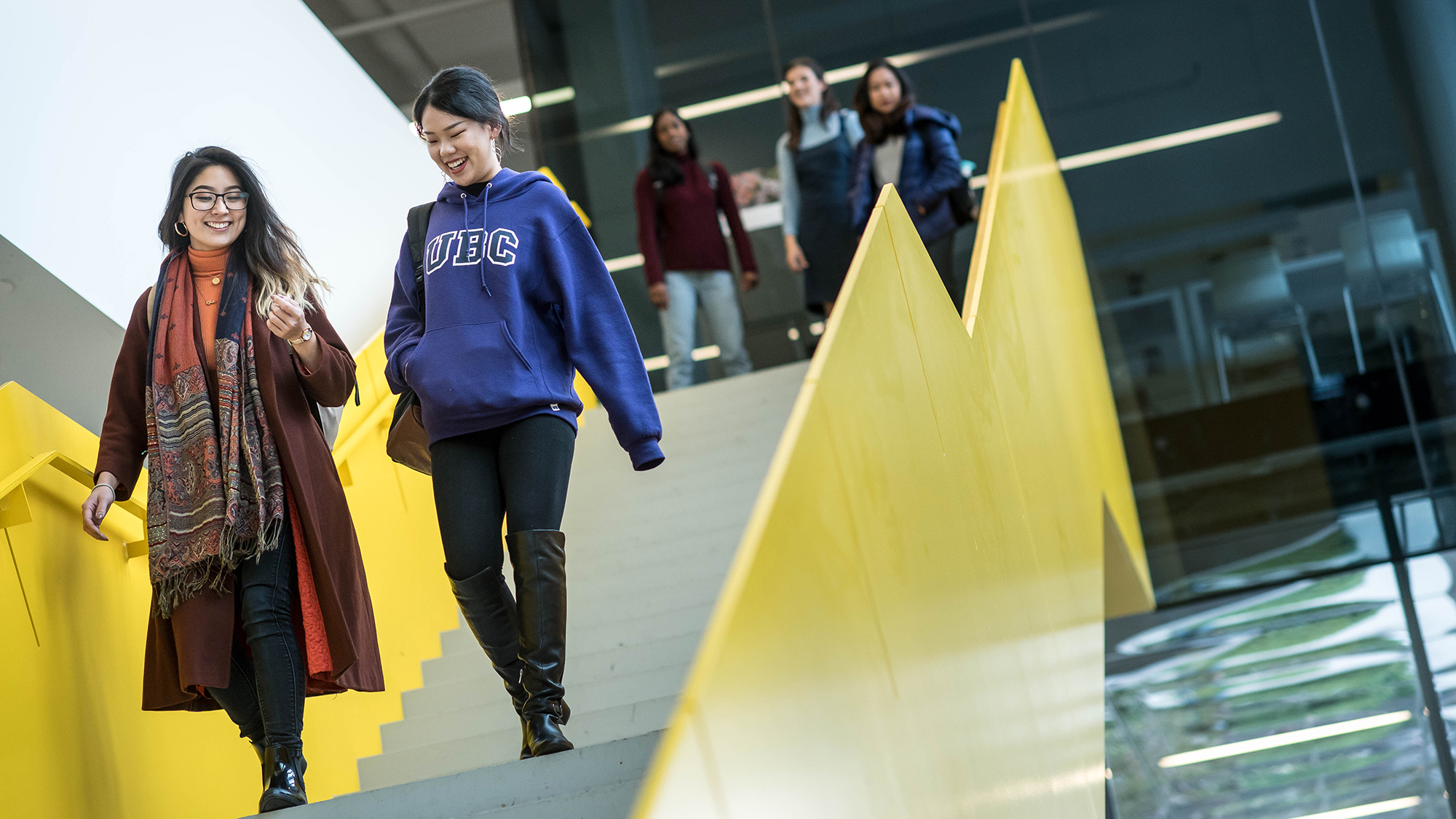

Sarah Galashan had wanted to be a journalist since age 16, and after she gained experience volunteering and interning at various news stations, she realized she thrived off the adrenaline in the fast-paced news environment.
Sarah graduated from UBC in 2000 with a BA in Canadian Studies.
Ever since she was 16 years old, she has known that she wanted to be a journalist. So after attending her UBC orientation she immediately located the student newspaper office and got involved as soon and as much as she could.
Throughout her university degree, there were two main things that were important to her: her courses and her work at the Ubyssey. These two areas of focus, plus knowing that she wanted to be a journalist in Canada, helped her to decide to major in Canadian Studies.
Determined to land an internship, in her third year, Sarah sent out about eighty resumes with stories she had written at the Ubyssey. From these, she received two callbacks and finally accepted an internship at the National Post.
To increase her contacts in the field, while she was still a student she also joined the Canadian Association of Journalists and conducted many informational interviews.
When Sarah graduated, she got another internship with the Hamilton Spectator, followed by another contract position with the Vancouver Sun. She was later approached by an editor from Global BCTV who hired her and trained her, helping Sarah to eventually land her current position as a National Reporter for CTV News.
If you are interested in pursuing a career in journalism, Sarah recommends that you find opportunities to write and get published, like working for the Ubyssey.
She encourages Arts students not to believe in the negative stereotype that “it’s only a BA”. After all, it worked out well for her that a BA plus appropriate on-the-job experience was enough to land her a great career.
She also advises students not to feel threatened by the competitiveness of the industry: employers have to hire someone – so why not you?
What is your current job title?
National Reporter, CTV News.
What were your job titles leading up to this one?
Ubyssey Reporter at UBC; Intern Reporter at National Post; Intern Reporter at Hamilton Spectator; Contract Reporter at Vancouver Sun; General Assignment Reporter at Global BCTV
How did you find and land your current job?
I had been working on contract at the Vancouver Sun newspaper and an editor who had seen my work recommended me for an entry-level TV reporter position at Global BCTV.
Because CanWest owns the Vancouver Sun and Global, and this is a very small industry, people know one another and opportunities for advancement can come up. I came to CTV a few months later after talking to a senior staff member there that I got to know through networking.
Can you give me an overview of your job description?
As one of two national reporters based in Vancouver, I report on stories of national interest. The stories are mostly assigned and come up through our contacts and sources in the city, as well as from other news that is happening around the country.
I try to be on scene if possible, along with a cameraperson. If not, I hire a freelancer. Important aspects of the job are doing the background research first, covering the stories as they happen, and making the tight deadlines.
Can you give me an overview of the day-to-day tasks that you do?
I read the papers, listen to the radio, liaise with Toronto to discuss the big issues, decide which area to cover, and start lining up and conducting interviews.
What aspects of your job are most important and satisfying to you?
When I know I’ve told a story well and that it’s made a difference. When people can take and use the information and it’s a mutually enriching experience, that makes my job really rewarding.
What aspects are least satisfying to you?
When it’s a slow news day. Only eight stories can run in the half-hour time slot, so only a few stories air nightly. I really enjoy being part of the news cycle, and so when that doesn’t happen, that’s the part of the job I like least.
If there’s anything you could change about your job, what would it be?
I wouldn’t change anything right now. I’m very happy!
Before you started, did you know what the job would be like?
I had a good idea of the field from working at the UBC student newspaper, so I knew there would be tight deadlines and that I would talk to new people every day. I knew that it would be fun and that I enjoyed that kind of work.
Although there was more pressure at the National Post in the sense that I was not used to a daily deadline, I enjoyed it, and found that I thrive off the adrenaline in this kind of work environment.
How did you do your research?
I talked to people who were either in the field or planning to be and took the advice I heard.
I joined the Canadian Association of Journalists, which I highly recommend. They have a student rate, offer student awards and participation in the association provides a great way to get involved and meet people in the industry.
I also emailed questions back and forth with a Vancouver journalist, who I used as a mentor, which was very helpful as well. I took risks and opportunities when they came up and learned what I could hands-on.
What salary range could most BA graduates expect in this field?
I actually never knew what a journalist made before I became one, and to be honest, I really didn’t care. It was only when they teamed me with a senior journalist at the National Post that I found out what kind of money people make in this field.
Generally, the salaries run higher in TV than in print, depending on the size of the newspaper or the TV station. Interns earn around $30,000 to start, and the broad range over the course of a career in journalism is between $35,000 and $120,000.
What would you recommend that students interested in this field do while they’re in school to better their chances of finding work in this field?
If you’re interested in journalism, find opportunities to do it. Work for the Ubyssey and get published. It’s really important to test the water to see if you like it.
If you love it and you’re really determined, you’ll put the effort in and that is how to succeed in this field. Focus and clarity are key. If you focus on what you want to do rather than what can you do, and then do it, that is the best way to succeed in any field.
What skills from your Arts degree helped you to create or find your current job?
My English courses helped a lot. In fourth year I took Advanced Composition with Christine Parkin and learned once and for all how to use a semi-colon correctly, which has really stuck with me!
Other classes I took that provided me with great background knowledge were Canadian History and Political Science, which are also helpful in my job.
Writing is still huge, even though I’m in TV now, because it’s clear whether you write well or not in all aspects of the communications field. Interpersonal skills such as listening are key also, as well as being flexible.
As well, organization skills have been very important. Having learned to listen and pay attention even when I’m not interested in the material being covered has been helpful too!
Is this a job that someone with a BA could easily do?
I do it, so why not? There are lots of opportunities out there, and you shouldn’t get trapped in the negativity of “it’s only a BA.” Many employers expect a BA, but also other skills and a strong personality, so if you focus and apply your skills practically along the way you’ll be fine.
UBC as a whole provided all I needed, both course-wise and extra-curricular activity-wise to enter this career path. For example, when APEC was here it was an event of national significance and I got to report on it right here on campus and it became part of my clipping file which helped me land my internship at the National Post.
Events like this are a great learning experience for many students and there are tons of opportunities here. You’re only responsible for taking the initiative to get involved.
Why did you choose UBC?
I had visited this campus before because my father is a pilot and we flew to Vancouver fairly often. I had a sense of adventure and liked it here. I also had friends who had studied here and recommended it.
When did you start your post-secondary education?
In September 1995.
How did you choose your major?
I initially thought I would study Political Science or English because these would give me a broad exposure to a little of everything. I knew I wanted to be a journalist, but I had other interests besides writing. I also knew I wanted to work as a journalist in Canada, so I eventually decided to major in Canadian Studies.
Did you ever change your mind about your Major?
Not really, there were two things most important to me while I was at UBC: my courses and my work at the Ubyssey student paper.
During my first year I socialized a lot, but in my second year and after that, I wanted to make my time here really count towards what I could apply to my career.
Did you have an idea of what to do career-wise after graduation?
Yes, I had known since I was 16 that I wanted to be a journalist.
What did you think the options were for BA graduates?
It is scary for Arts students, because we’re not training for one specialized field. Instead, we have to learn to learn quickly and adapt.
I assumed everyone would find a job, but because I knew I wanted to be a Journalist, I was willing to pursue further post-secondary schooling if needed, in order to fulfill my career dream.
I was hoping I wouldn’t have to, of course, and it has worked out for me that a BA and appropriate on-the-job experience was enough for me to end up in a great career.
What did you think you would do after graduation?
I had a Plan A and a Plan B. If I didn’t get an internship at a newspaper (Plan A), I decided I would go to Columbia University in New York or do a Master’s in Journalism at UBC.
I had been working towards setting up an internship since my second year, by getting my resume and portfolio together and by sending it out. In second year, I applied as an intern at the Hamilton Spectator, which was a fairly small paper, but didn’t land the position.
In my third year, I sent out about eighty resumes with clippings from stories I’d written at the Ubyssey. I searched the Internet to find the editor contact information for any Canadian newspaper I could find and sent them my application.
I had heard it was very competitive for internships, especially for a non-journalism specialist, so I was willing to go anywhere in Canada in order to land my first job.
What were your non-academic interests in high school and university?
In high school, I always read the newspaper, as I was interested in current events. I also participated in student council. In university I swam for exercise and worked at the Ubyssey, which I loved.
What extracurricular activities were you involved in while at UBC?
Almost exclusively the Ubyssey. I sometimes got to school at 9 am and stayed on campus until midnight.
My co-workers became both my social circle and training ground. Actually, many students who worked at the Ubyssey became professional journalists.
The threat of competitiveness should never stop you, because employers need to hire someone, so why not you?
How did you choose this activity?
I knew I needed to find a way to learn hands-on, so when I went to my UBC orientation I asked where the student paper was and got involved as soon as I could.
I love news and the adrenaline of getting stories. I also liked writing and story telling, as well as the fact that there is something different every day and I enjoy variety.
Did your involvement help you to gain experience or skills transferable to your current job?
No question, absolutely yes. I landed my internship at the National Post because of my experience there. They called my within the hour of receiving my resume… and I worked there as a reporter for four months after I graduated from UBC.
Were you ever worried or afraid about what kind of work was available after graduating with a BA?
Yes, I was worried and think that most students are. Nothing is ever for sure, no matter what kind of educational background you have.
However, I would have done whatever it took to reach my career goal and so I did what editors and mentors suggested I do, and that has worked out very well for me.
What steps brought you to your current career?
I worked at the Ubyssey paper at UBC, did a four-month summer internship at the National Post, came back to school to finish my degree, then got another internship with the Hamilton Spectator. I stayed there after the summer internship on contract, then got another contract position at the Vancouver Sun.
Although I was supposed to stay for a year, I was approached by an editor from Global BCTV in the Fall of 2001 who hired me and trained me as an entry-level TV Reporter.
This happened largely because CanWest owned the Vancouver Sun and Global so it was a small industry, and people notice if they like what you do. I came to CTV shortly after that, after talking with a senior person at CTV who I met through networking.
Did you plan to be where you are now career-wise?
No, I planned to be in newspapers initially, but I enjoy the position I’m in currently.
How important were your grades in terms of landing your current job?
Not important at all, although they could have been if I had decided to pursue a Master’s degree.
What is the worst thing a student could do with respect to working in this field?
Being passive and not taking action.
Looking back, is there anything you would have done differently while at UBC?
Sometimes I think I would have spent a little less time at the Ubyssey and had some more relaxed fun. Perhaps I could have been somewhat more balanced.


